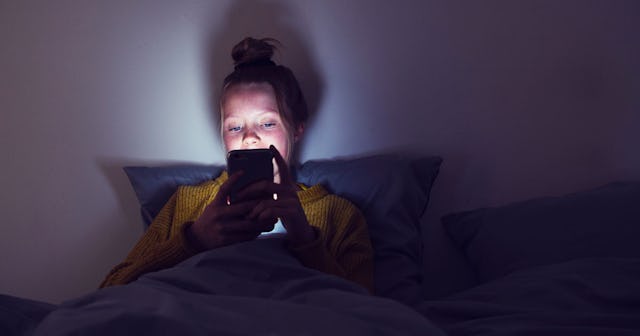I Took My Teens' Cell Phones Away At Night — And Noticed A Huge Difference

When my children were younger they didn’t have access to a lot of electronics. They never had televisions in their rooms, and they didn’t get cell phones until they were 12 or 13.
I had no idea what I’d be in store for when they all got laptops in the seventh grade, and we decided that would also be the year we gave them cell phones.
They quickly went from pretty good kids who mostly listened, to sneaking, lying kids who couldn’t get enough of their various devices.
My then-husband and I would take their phones away around eight and send them off to bed. It was fine the first few nights, but then we caught my daughter up late one night FaceTiming with a friend at midnight. She spilled the beans and told me her siblings did the same thing.
It hit me then that they had all been so cranky, unmotivated, and no longer wanted to play outside with their friends, so we took their devices away.
We were the only parents who did this, my daughter informed me. According to my children, all their friends had access to their phones and computers, all the time.
The battle went on and I gave up. My thought process was, if they were allowed to have access to them all the time, it would lose its luster and they’d begin to fall asleep at a decent hour and want to do something else with their time.
But that didn’t happen — in fact, things got worse.
It was then that I started collecting three laptops, two iPads, and three cell phones every night, and practically kept them strapped to me.
Don’t get me wrong; the results weren’t immediate. But after a little time and a lot more fighting, I started to see positive changes. This is what happened when I got really serious about taking my teens’ electronics away:
They slept better.
A study conducted in 2015 polled almost 10,000 teenagers ages 16-19 who used their cellphones at night and found they were up to 50% more likely to take an hour to fall asleep.
We all know once you miss that window, it can be really hard to catch those Zs.
Even if they say they will put it away at a certain time (they probably won’t), The American Academy of Pediatrics found that sleeping with a cell phone near you is worse than falling asleep with the television on.
Not only do our kids get less sleep while snoozing next to a small screen, the study found kids also had “a higher prevalence of perceived insufficient rest or sleep.”
My daughter, who is 16, will now admit this. She’s able to fall asleep with no problem on most nights. She even told me she used to wake up several times a night to check her phone when she was sleeping with it next to her.
Their concentration was better.
AARP reports, “The prime culprit in hijacking attention spans is the smartphone.” I noticed my kids were so impatient, and trying to get them to do homework, or get ready to go anywhere was excruciating. They weren’t able to focus before they had their devices.
William Klemm, senior professor of neuroscience at Texas A&M University and author of Teach Your Kids How to Learn, told AARP, “The brain starts learning how to switch rapidly from one task to another. It has become a habit. But this habit conflicts with focused attentiveness.”
They did other things in their room at night, like read or draw.
This was a great advantage, but it took a while for them to realize they had to occupy their time with something other than a phone or computer. They knew they didn’t have a choice, so they could either stare at the ceiling or do something else to wind down.
They seemed happier.
I’m sure much of this has to do with sleep. But all of my children have admitted — however grudgingly — that less phone time does make them feel happier. Even if it’s hard for them to walk away from it on their own.
If it makes for happier, healthier kids, I’m more than happy to be “the only mom in the world who takes cell phones away at night.”
This article was originally published on